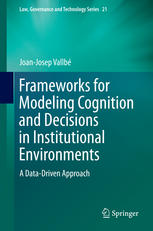

Most ebook files are in PDF format, so you can easily read them using various software such as Foxit Reader or directly on the Google Chrome browser.
Some ebook files are released by publishers in other formats such as .awz, .mobi, .epub, .fb2, etc. You may need to install specific software to read these formats on mobile/PC, such as Calibre.
Please read the tutorial at this link: https://ebookbell.com/faq
We offer FREE conversion to the popular formats you request; however, this may take some time. Therefore, right after payment, please email us, and we will try to provide the service as quickly as possible.
For some exceptional file formats or broken links (if any), please refrain from opening any disputes. Instead, email us first, and we will try to assist within a maximum of 6 hours.
EbookBell Team

5.0
40 reviewsThis book deals with the theoretical, methodological, and empirical implications of bounded rationality in the operation of institutions. It focuses on decisions made under uncertainty, and presents a reliable strategy of knowledge acquisition for the design and implementation of decision-support systems. Based on the distinction between the inner and outer environment of decisions, the book explores both the cognitive mechanisms at work when actors decide, and the institutional mechanisms existing among and within organizations that make decisions fairly predictable.
While a great deal of work has been done on how organizations act as patterns of events for (boundedly) rational decisions, less effort has been devoted to study under which circumstances organizations cease to act as such reliable mechanisms. Through an empirical strategy on open-ended response data from a survey among junior judges, the work pursues two main goals. The first one is to explore the limits of “institutional rationality” of the Spanish lower courts on-call service, an optimal scenario to observe decision-making under uncertainty. The second aim is to achieve a better understanding of the kind of uncertainty under which inexperienced decision-makers work. This entails exploring the demands imposed by problems and the knowledge needed to deal with them, making this book also a study on expertise achievement in institutional environments.
This book combines standard multivariate statistical methods with machine learning techniques such as multidimensional scaling and topic models, treating text as data. Doing so, the book contributes to the collaboration between empirical social scientific approaches and the community of scientists that provide the set of tools and methods to make sense of the fastest growing resource of our time: data.